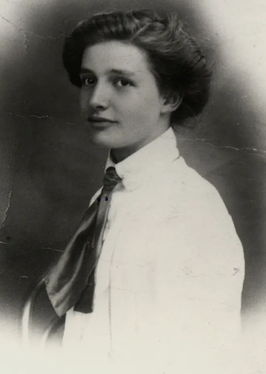Related Research Articles
Jacqueline Simpson is a prolific, award-winning British researcher and author on folklore.
Iona Margaret Balfour Opie, and Peter Mason Opie were an English married team of folklorists who applied modern techniques to understanding children's literature and play, in studies such as The Oxford Dictionary of Nursery Rhymes (1951) and The Lore and Language of Schoolchildren (1959). They were also noted anthologists, assembled large collections of children's literature, toys, and games and were regarded as world-famous authorities on children's lore and customs.

Steve Roud is the creator of the Roud Folk Song Index and an expert on folklore and superstition. He was formerly Local Studies Librarian for the London Borough of Croydon and Honorary Librarian of the Folklore Society.
The Folklore Society (FLS) is a registered charity under English law based in London, England for the study of folklore. Its office is at 50 Fitzroy Street, London home of the Royal Anthropological Institute of Great Britain and Ireland.
Eliza Gutch (1840-1931) was an English author, contributor to Notes and Queries, and founding member of the Folklore Society. She made immense contributions to the establishment of folklore and dialect studies.
Violet Alford was an internationally recognised authority on folk dancing and its related music, costume, and folk customs. She believed that a common prehistoric root explained the similarities found across much of Europe.

Ethel Rudkin was an English writer, historian, archaeologist and folklorist from Lincolnshire. She pioneered the collection of folk material, particularly from Lincolnshire, and her collections are now part of several public institutions, including the North Lincolnshire Museum.
Walter Leo Hildburgh (1876-1955) was an American art collector, sportsman, traveller, scientist and philanthropist.
Arthur Robinson Wright, better known as A. R. Wright was a British folklorist who was elected President of the Folklore Society, fellow of the Society of Antiquaries and fellow of the Royal Anthropological Institute. He also conducted influential work at the Patent Office.
Venetia Newall (1935–2017) was an English-American folklorist who was elected president of the Folklore Society and fellow of the American Folklore Society.
Joshua Roy Porter was a British Anglican priest, theologian and author. Having been chaplain and fellow of Oriel College, Oxford, from 1949 to 1962, he was Professor of Theology at the University of Exeter from 1962 to 1986.
Sona Rosa Burstein (1897–1971) was a museum curator, folklorist and historian of gerontology.
Stewart Forson Sanderson (1924–2016) was a Scottish folklorist and linguist.
Edward Fletcher Cass was a British miner, banker and authority on Lancashire folklore, industrial archaeology and the arts who was President of the Manchester Literary and Philosophical Society, Folklore Society, Lancashire and Cheshire Antiquarian Society and Society for Folk Life Studies.
Roy Judge (1929–2000) was a British folklorist and historian.
Arthur Allan Gomme (1882-1955) was a British librarian, historian of technology and folklorist.
Patricia Lysaght is an Irish folklorist. She is Professor Emerita of European Ethnology, University College Dublin, Ireland.
Thomas East Lones (1860–1944) was a British folklorist, noted for his research into British calendar customs.
Christina Hole was an award-winning British folklorist and author, who was described as “for many years the leading authority on English folk customs and culture”.
Thomas Fairman Ordish (1855-1924), sometimes also referred to as T. Fairman Ordish was a British folklorist, noted for his interest in traditional drama and folk play, early theatre and the history of London. He is credited as having undertaken "the first major investigation of British traditional drama".
References
- 1 2 "Alex Helm". Oxford Reference. Retrieved 30 June 2021.
- 1 2 Dean-Smith, Margaret (1 March 1970). "Obituary Alex Helm 2nd March, 1920 – 22nd January, 1970". Folklore. 81 (1): 63–64. doi:10.1080/0015587X.1970.9716661. ISSN 0015-587X.
- 1 2 "Alex Helm Collection | Folk Play Research website". folkplay.info. Retrieved 30 June 2021.
- ↑ Helm, Alex (1950). "The Cheshire Soul-Caking Play". Journal of the English Folk Dance and Song Society. 6 (2): 45–50. ISSN 0071-0563. JSTOR 4521337.
- ↑ Helm, Alex (1954). "The Rushcart and the North-Western Morris". Journal of the English Folk Dance and Song Society. 7 (3): 172–179. ISSN 0071-0563. JSTOR 4521452.
- 1 2 3 Cass, Eddie (1 April 2011). "Alex Helm (1920–1970) and His Collection of Folk Performance Material". Folklore. 122 (1): 1–15. doi: 10.1080/0015587X.2011.537126 . ISSN 0015-587X.
- ↑ Helm, Alex (1 September 1955). "Report on the Ordish Papers". Folklore. 66 (3): 360–362. doi:10.1080/0015587X.1955.9717489. ISSN 0015-587X.
- ↑ Heaney, Michael (2 July 2020). "Christopher Cawte (1932–2019)". Folklore. 131 (3): 310–312. doi: 10.1080/0015587X.2019.1699752 . ISSN 0015-587X.
- ↑ Cawte, E. C.; Helm, Alex; Marriott, R. J.; Peacock, N. (1960). "A Geographical Index of the Ceremonial Dance in Great Britain: Part One". Journal of the English Folk Dance and Song Society. 9 (1): ii–41. ISSN 0071-0563. JSTOR 4521603.
- ↑ Cawte, E. C.; Helm, Alex; Peacock, N. (1961). "A Geographical Index of the Ceremonial Dance in Great Britain: Addenda and Corrigenda". Journal of the English Folk Dance and Song Society. 9 (2): 93–95. ISSN 0071-0563. JSTOR 4521620.
- ↑ Cawte, E. C; Helm, Alex; Peacock, N (1967). English ritual drama: a geographical index. London: Folk-lore Society. ISBN 978-0-903515-01-6. OCLC 124592.
- 1 2 Cawte, E. C. (1970). "Alex Helm 1920-1970". Folk Music Journal. 2 (1): 72–73. ISSN 0531-9684. JSTOR 4521870.
- ↑ "Search Results". archives.ucl.ac.uk. Retrieved 30 June 2021.